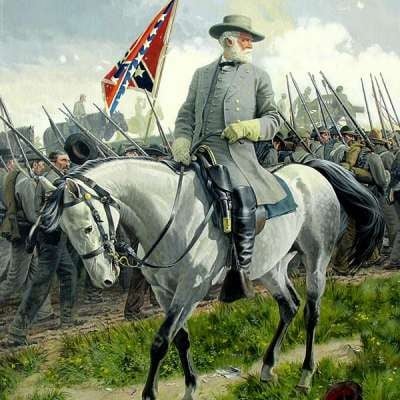United States
About
Born to Revolutionary War hero Henry "Light-Horse Harry" Lee in Stratford Hall, Virginia, Robert Edward Lee seemed destined for military greatness. Despite financial hardship that caused his father to depart to the West Indies, young Robert secured an appointment to the United States Military Academy at West Point, where he graduated second in the class of 1829. Two years later, he married Mary Anna Randolph Custis, a descendant of George Washington's adopted son, John Parke Custis. Yet with all his military pedigree, Lee had not set foot on a battlefield. Instead, he served seventeen years as an officer in the Corps of Engineers, supervising and inspecting the construction of the nation's coastal defenses. Service during the 1846 war with Mexico, however, changed that. As a member of General Winfield Scott's staff, Lee distinguished himself, earning three brevets for gallantry, and emerging from the conflict with the rank of colonel.From 1852 to 1855, Lee served as superintendent of West Point, and was therefore responsible for educating many of the men who would later serve under him - and those who would oppose him - on the battlefields of the Civil War. In 1855 he left the academy to take a position in the cavalry and in 1859 was called upon to put down abolitionist John Brown’s raid at Harpers Ferry.
Because of his reputation as one of the finest officers in the United States Army, Abraham Lincoln offered Lee the command of the Federal forces in April 1861. Lee declined and tendered his resignation from the army when the state of Virginia seceded on April 17, arguing that he could not fight against his own people. Instead, he accepted a general’s commission in the newly formed Confederate Army. His first military engagement of the Civil War occurred at Cheat Mountain, Virginia (now West Virginia) on September 11, 1861. It was a Union victory but Lee’s reputation withstood the public criticism that followed. He served as military advisor to President Jefferson Davis until June 1862 when he was given command of the wounded General Joseph E. Johnston's embattled army on the Virginia peninsula.
Lee renamed his command the Army of Northern Virginia, and under his direction it would become the most famous and successful of the Confederate armies. This same organization also boasted some of the Confederacy's most inspiring military figures, including James Longstreet, Stonewall Jackson and the flamboyant cavalier J.E.B. Stuart. With these trusted subordinates, Lee commanded troops that continually manhandled their blue-clad adversaries and embarrassed their generals no matter what the odds.



